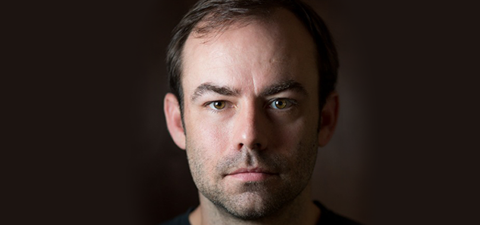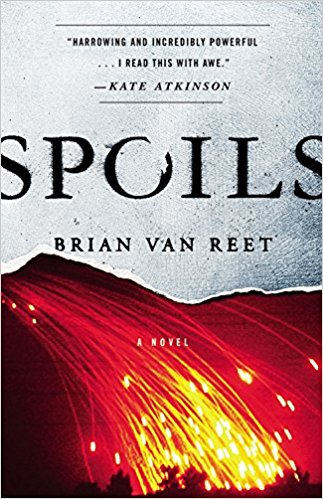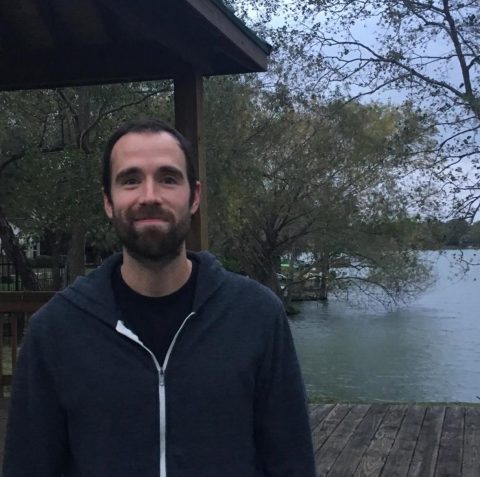Black blood. Stringy flesh. Clutching. Entangling. Stumbling. Close-third person. Present tense. A hot center. Van Reet’s opening scene establishes the motif of within and without—a hall of dissimilar but equally destructive mirrors, of characters who seek escape and end up tangled in razorwire. —Michael Carson
Spoils
Brian Van Reet
Lee Boudreaux Books, 2017
304 pages, $26.00
.
In his 1955 preface to Isaac Babel’s Collected Stories, Lionel Trilling confesses to being disturbed by the “terrible intensities, ironies, and ambiguities” of Babel’s Red Cavalry. “They were about violence of the most extreme kind,” says Trilling, “yet they were composed with a striking elegance and precision of objectivity, and also with a kind of lyric joy, so that one could not at once know how the author was responding to the brutality he recorded, whether he thought it good or bad, justified or unjustified.”
Brian Van Reet’s first novel, Spoils, also disturbs. A veteran of the Iraq War and Michener graduate, Van Reet has published award-winning short stories about the U.S. occupation of Iraq and U.S. soldiers returning home from Iraq. There is a tenacity in his prose unique to soldier writers, a furious exactness, and yet a delicacy also, an earned incandescence. Reading him, one understands that this is not a young man recording his war experiences, a “moral witness”—this is an artist, an artist compelled to write war.
Spoils opens several weeks after the 2003 Iraq invasion. Cassandra Wigheard, a female Military Police specialist, pulls security in a Humvee at a roundabout outside Baghdad. Two males, one crass and bigoted, the other paternal and sentimental, keep her company. It’s unclear why they have to sit there exposed. It’s also unclear why they are in Iraq at all. The Why is muddled. All that matters is the now. The fact of war. “This one is bored tonight,” says the narrator. “She would move closer to the war’s hot center.”
Mortars answer her prayers: “Down below, the driver’s door opens, and Crump stumbles into the street, clutching his face, yelling: black blood falls from his hands, stringy flesh draped on his cheek. The other door opens, and McGinnis looks up at her helplessly before ducking around to the back side, out of her line of fire, going for Crump, who has stumbled farther away and tripped over a roll of concertina, thus entangling himself in razor wire. Everything going to shit too fast to believe.”
Black blood. Stringy flesh. Clutching. Entangling. Stumbling. Close-third person. Present tense. A hot center. Van Reet’s opening scene establishes the motif of within and without—a hall of dissimilar but equally destructive mirrors, of characters who seek escape and end up tangled in razorwire. The section concludes as another soldier drags Cassandra into a canal “over which streams of glowing red and green tracers hurtle gracefully like a hail of burning arrows launched from the wall of a medieval fortress.” She sinks down “into the dark tangle of fluid reeking of pungent, musty life.” She is no longer bored.
The next narrator, one of those responsible for the mortar attack, also seeks an end to boredom, an escape from the aimless ennui of civilized hypocrisy. Al-Hool abandons an upper-middle-class life in Cairo for that of a mujahedeen in Afghanistan, then Chechnya, and then, eventually, Iraq, because this is what the logic of exit demands, the rotating absolution of movement toward ever-greater violence. Al-Hool has many justifications for his jihad adventurism, none of them especially religious—he, like all the protagonists, have little patience for or with God—the most succinct of which is this: “Exit. War.”
That warm hot center. Later, trapped in an apartment in Fallujah, Al-Hool can’t bear to think he has been repeating the same mistakes over and over again, “that the years have taught me nothing or, worse, that I have learned something vital but am unable to apply it.” His fellow mujahedeen video the beheadings of U.S soldiers. They saw off heads. Their broadcasts send the war spinning out of control (if war is in fact a thing controlled) and give the adventurers the lack of control they thought they craved. “Praise God that what is gone, is dead,” Al Hood prays, remembering his dead son, swallowed by jihad.
The final narrator, a U.S. Army tanker, alone relates events in the past tense. A “watcher” with a fainting problem, Sleed leaves his parents’ basement and pill snorting to find “a higher purpose” in the Army. He talks much about thing getting “real.” His tankmates take pictures of massacred Iraqis. They steal from Saddam’s Palace. They accidently kill civilians. They blow up buildings. Things become “real.” He has found that place where “everything matters so much, it is pointless to worry about anything.” “Believe me,” Sleed says after escaping an IED blast, “I’ve tried them all, and there’s not much that will get you higher.”
His tank crew speeds back and forth across the hot center, touching it and running away, like a child’s game, a dare. Sleed picks up the shattered skulls of Americans who didn’t make it to the other side: “A deep pain beat at the center of me, and I thought I was going to faint again, but all I did was retch up water.” They bumble forward in their ten-million dollar machine blowing up mujahedeen and civilians and everything in between. “The whole world watching,” says Sleed, “and no one but us knew the truth.”
Mistakes are made. A quest plot is twinned with an escape plot (and what is the difference, really?). Later, in another cell, a captured U.S. soldier: “Come and do it!” he shrieked, the kind of unmodulated shrillness that can only from a human being pushed to a place where the lines between fight and flight approach a vanishing point. “Just get it the fuck over with!”
This is not a story about patriots. No one defends home and hearth in this book. Not Al-Hool, not Sleed, not Cassandra. This is not a story about disillusionment. This is a story about people who seek out the lines between fight and flight, those in love with this vanishing point, who perhaps want to vanish into the point. This is a story about people escaping home. This is a story about adventurers—those already disillusioned, and who seek out war to bury what is left of illusion.
How do you write a war story about those who are not patriots in the traditional sense? You triangulate their desires: you make a trinity that sabotages the either/or of war, what Paul Fussell in The Great War and Modern Memory called “adversarial proceedings” or “the gross dichotomizing” that “great imaginative habit of modern times.” You create a form to fit the subject, a trinity that does not allow any neat parallels, but a chaotic orbit of clusters, forever trading places around that warm sun of war.
Choric voices converge in Triangle (!) Town, a suburb of Baghdad, a derelict backwater populated by crippled Iraqi children and their destitute elders; it is a new warm space, another of those spots that draw the adventurous like moths—a geography, like Afghanistan, “at the edge of the known world and at the same time, its obscure, violent nexus.” There, freshly trapped in Humvees, tanks, factories, basements, and ditches, our heroes find an escape. They escape into darker cells, new prisons.
One of their number, Cassandra, knows this already. Her story, related entirely in the present tense, risks becoming nothing but the present, becoming nothing at all: “No matter how much she wants to, she can’t close her eyes, and even if she did, no sleep would come. Her heart feels like it’s working too hard, straining itself like a leaky pump with more air than blood rushing through fleshy valves. Time stretches thinner and thinner, shedding its one elemental quality, forward progression, like a strand of gold spun so fine, it loses atomic color and becomes clear.”
This clarity, this moment, this invasion, the videotapes, the American money, spawns “forward progression,” more invasions, more death, more money, a rippling effect not unlike a tide pool with waves going to and away from and parallel to shore. Triangle Town will be destroyed. Iraq too. We (of the future) know the ending. But that doesn’t stop the story does it? No one listens to Cassandra. Clytemnestra murders Agamemnon; Orestes, Clytemnestra. Athena saves no one. Time stretches thinner and thinner. We move ever onward to that warm center. Clarity.
Sleed, the voyeur, the fainter, the trophy-hunter, claims “the whole world watches but no one but us knows the truth.” But the truth deceives, takes away when it gives. “The night before,” says Sleed. “I’d been destroyed by regret, but now it turned inside out, to anger, like when you do something wrong and get called on it.” Regret becomes anger and anger violence and violence regret and regret anger and anger violence. Sleed has his own prayer: “There’s a certain way of doing it where the good guys become bad guys and the bad good, and there’s another way I wish I do where there are no categories.” He still wants an exit. But he is already at war.
Near the novel’s end Al-Hool looks on the Iraqi landscape. The beauty surprises him: “It was the palm groves, I think, the neat rows of them, the way they appeared from the moving car, each tree shifting in parallax with those in front and behind, creating an illusion of infinite depth, as if you could walk forever through the groves.” From the right angle, the prison bars offer hope, from another, a hall of mirrors. The sins of Al-Hool and the Americans—the decapitated heads and destroyed neighborhoods—are resurrected on televisions and computers across the globe. “Praise God that what is gone, is dead,” Al Hool prays.
“This is the end of boredom,” says Baulin, a war-wasted frostbitten twenty-two year old platoon commander, to the feckless narrator of Isaac Babel’s Red Cavalry—that voyeur, that “milk-drinker.” There is nothing Babel’s narrator covets more. But neither is there anywhere to go from there. That’s the point. The myth of Cassandra is not a happy one; it is, however, an artful one.
In his discussion of Red Cavalry, Trilling describes writers predisposed “to create a form which in itself be shapely and autonomous and at the same time unusually responsible to the truth of things and events.” This writer “concerns himself with the given moment, and, seeming almost hostile to the continuity of time, he presents the past only as it can be figured in the present.” Van Reet’s novel does not merely replicate war experience like the ubiquitous recording devices in the novel itself, or as a moral witness might, eager to expose the horror of this or that incident of war for hope of a better, less violent, future; neither does Spoils offer excuses, justifications, that sliver of hope which comes with the past tense, that perspectival arrogance of a known future.
Instead, Spoils offers us shared tragedy—our shared attraction to the vanishing point and perhaps our shared hostility to the continuity of time. The enemy, it turns out, stumbles for an exit too; the enemy, it turns out, recoils in horror at not just the violence at every exit, but the way in which time transforms and redeems this violence. The enemy is us and we are the enemy. Thus are the spoils of war. Van Reet’s prose is supple. There is a kind of “lyric joy” in this brutal record. It never drags. It is we who drag—the way we inch ever closer towards war’s hot center.
—Michael Carson
N5
Michael Carson lives on the Gulf Coast. His non-fiction has appeared at The Daily Beast and Salon, and his fiction in the short story anthology, The Road Ahead: Stories of the Forever War. He helps edit the Wrath-Bearing Tree and is currently working towards an MFA in Fiction at the Vermont College of Fine Arts.
.
.


